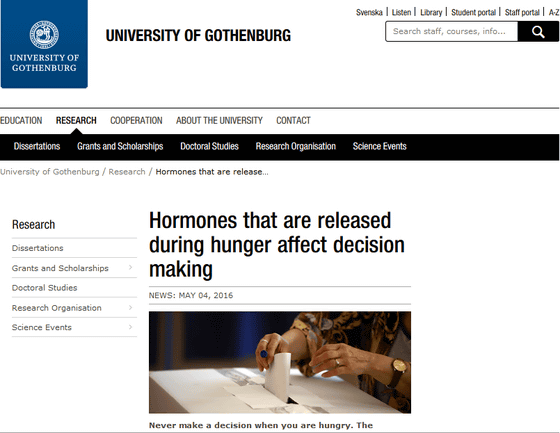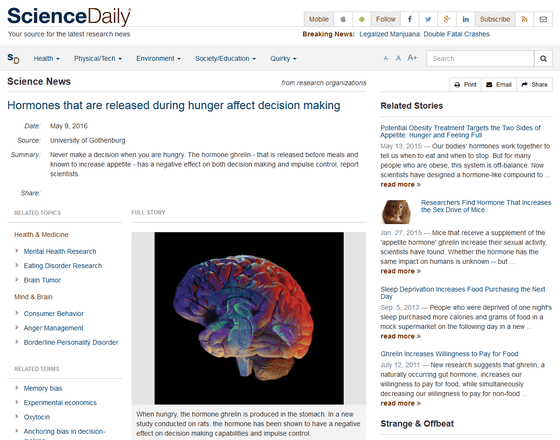Research results that hormones secreted when hungry exerts a negative effect on decision-making and impulse suppression appear

ByEhpien
It is secreted when hungry and increases appetite "Ghrelin"The hormone that has a negative effect on decision-making and impulse suppression is that SwedenUniversity of GothenburgIt became clear by research of.
Hormones that are released during hunger affect decision making - University of Gothenburg, Sweden
http://www.gu.se/english/research/news-detail//hormones-that-are-released-during-hunger-affect-decision-making.cid1371570

Hormones that are released during hunger affect decision making - ScienceDaily
https://www.sciencedaily.com/releases/2016/05/160509085807.htm

"Ghrelin" is known to be secreted in the stomach on an empty stomach, but according to Karolina Skibicka of the University of Gothenburg University Academy Sahlgrenska, as the amount of ghrelin increases, there are more impulsive things to the brain's work, It is said that it was newly discovered in the research using rat that the influence is given to the ability to make a rational decision. The "impulses" mentioned here can be divided into two types: impulsive behavior and impulsive choice.
Mr. Skibicka first taught the state of rats "I can receive sugar when pushing a lever" or "I can get sugar by not pushing the lever when some type of signal comes out". Signal refers to things like lights shining, sounds ringing.
When the rats were given ghrelin, they said that despite the signal that sugar is wanted, a signal not to press the lever comes out, it is no longer able to resist the urge to push the lever and get sugar. For example, when there is an option "You can receive one cookie right now" "If you wait a few minutes, you get multiple cookies", the reasonable choice is "wait a few minutes and get multiple cookies" When the amount of ghrelin increases, it becomes impossible to make a rational judgment, and it seems that you are choosing who to receive "one cookie right now" impulsively.
According to Skibicka, when you stop ghrelin administration, you can no longer see such impulsive behavior. Meanwhile, there is fasting as a way to increase ghrelin naturally, but impulsive behavior has increased even in a short period of fasting.
According to research, the long-term increase in ghrelin caused genetic change in the brain circuit involved in decision making and impulses. The impulse is characterized by behavioral disorders such as ADHD, obsessive-compulsive disorder, autism, drug abuse, and eating disorder, and in the future the brain ghrelin receptor will be the target for the treatment of these diseases You get it, Skibicka says.
Related Posts:
in Science, Posted by logc_nt







